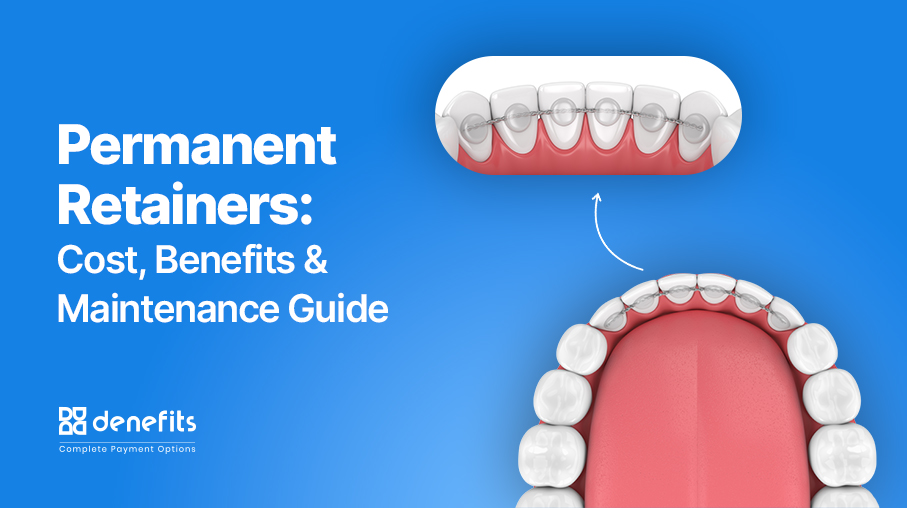
Are you thinking about transforming your smile with dental veneers? You’re not alone! According to Cleveland Clinic,veneers are becoming a go-to option for those looking to hide stains, chips, or small gaps for a brighter, more even look. These thin layers of porcelain or composite resin are custom-made to fit right over your teeth, making a big difference in your smile. However, one of the biggest questions is often, “How much do veneers cost?”
The veneers cost can vary, but knowing what affects the price can help you budget and plan for this investment. Here are a few key things to note:
► Material: Veneers can be crafted from porcelain or composite resin. Porcelain veneers are typically more expensive, but they’re long-lasting, stain-resistant, and look very natural. Composite veneers cost less upfront, though they may not be as durable.
► Insurance & Financing Options: Veneers are usually considered a cosmetic treatment, so most insurance plans don’t cover them. However, in some cases, if veneers are needed to fix serious damage, there may be partial coverage. Many dental offices also offer financing plans to make veneers more accessible. Exploring these options may help make the process more affordable and manageable.
► Location: Where you live can also impact pricing. Dental services in big cities or areas with a higher cost of living usually come at a higher price than in smaller towns or rural areas.
► Lab Charges & Customization Fees: Since veneers are crafted to suit each individual's needs, the labs where they are fabricated may charge according to the work done. This adds to the overall cost.
► Number of Veneers Required: The total cost of the veneers may increase if teeth requiring veneers are more. Usually, individuals prefer veneers on 2 front teeth, but some prefer a complete smile makeover. Therefore, the cost will increase if the work is extensive. Therefore, the cost will increase if the work is extensive.
| According to YouGov, nearly one in five (17%) Americans have had a cosmetic dentistry procedure. |
This guide covers all you need to know about veneers cost to give you a realistic idea of what to expect and help you decide what’s best for your smile.
What Are Dental Veneers?
Dental veneers are super-thin shells that fit over the front of your teeth, instantly upgrading their look. Think of them as a makeover for your smile—covering up things like stains, small chips, gaps, and slight misalignments. Made from materials like porcelain or composite resin, veneers are popular because they can make a big difference with minimal work. They’re custom-made to blend naturally with your teeth, giving you a brighter, more even smile that you’ll feel great showing off.
How Much Are Veneers?
This table gives you a clear overview of each type of veneer, and an idea of the costs, longevity, and unique features each type offers.
| Type | Cost (per tooth) | Description | Durability | Key Features |
| Porcelain Veneers | $1,000 - $2,500 | Thin, custom-made porcelain shells that fit over the front surface of teeth, providing a natural and highly aesthetic look. | 10-15 years (with proper care) | Durable, stain-resistant, natural appearance, custom fit |
| Composite Resin | $200 - $1,800 | Veneers made from composite resin material, applied in layers directly to the tooth, then shaped and polished to mimic natural teeth. | 5-7 years (may require touch-ups) | Affordable, can be completed in one visit, less durable than porcelain |
| No-Prep Veneers | $900 - $2,300 | Ultra-thin veneers that don’t require extensive tooth preparation or enamel removal, often made from porcelain or other durable materials. | 5-7 years | Minimal tooth preparation, natural look, less invasive |
| Same-Day Veneers | $300 - $1,700 | Veneers created and applied in a single visit using CAD/CAM technology, often made from composite or ceramic materials. | 5-7 years | Immediate results, quick procedure, typically less durable than lab-made veneers |
| Palatal Veneers | $800 - $2,500 | Veneers designed specifically to repair the back surfaces of teeth, often for functional repair rather than cosmetic enhancement. | 10-15 years | Ideal for repairing wear and damage on the inner surfaces of teeth, high durability |
Phase-Wise Dental Veneers Cost
When considering dental veneers, understanding the cost breakdown for each phase can help you plan and budget effectively. Each step involves different procedures and costs - from the initial consultation to the final placement of your veneers.
| Phase | Typical Cost | Description |
| Consultation & Exam | $50 - $200 | Initial assessment to determine suitability for veneers. Some clinics may offer free consultations.. |
| Tooth Preparation | Included or $50-$200 per tooth | Enamel may be reduced for traditional veneers. No-prep veneers typically require less or no enamel removal. |
| Impressions & Temporaries | $120 - $300 | Custom impressions for veneers, with temporary veneers often provided while waiting for final placement. |
| Fabrication & Placement | Main veneer cost | Fabrication is the largest expense; bonding can take one or more appointments. |
| Follow-Up & Adjustments | $50 - $200 per visit | Post-placement visits for fit adjustments, if needed. |
Teeth Veneers Cost by U.S. State
In this section, we’ll explore how much you can expect to pay for dental veneers in various US states.
| State | Average cost per veneer |
|---|---|
| Alabama | $1, 959 |
| Alaska | $2,390 |
| Arizona | $1,983 |
| Arkansas | $1,972 |
| California | $1,877 |
| Colorado | $1,871 |
| Connecticut | $1,849 |
| Delaware | $2,368 |
| Washington, D.C. | $2,380 |
| Florida | $2,254 |
| Georgia | $2,245 |
| Hawaii | $1,835 |
| Idaho | $2,405 |
| Illinois | $1,742 |
| Indiana | $1,821 |
| Iowa | $1,672 |
| Kansas | $1,911 |
| Kentucky | $2,290 |
| Louisiana | $1,927 |
| Maine | $1,546 |
| Maryland | $2,045 |
| Massachusetts | $1,716 |
| Michigan | $1,933 |
| Minnesota | $1,977 |
| Mississippi | $1,522 |
| Missouri | $1,813 |
| Montana | $1,978 |
| Nebraska | $1,856 |
| Nevada | $1,921 |
| New Hampshire | $1,773 |
| New Jersey | $1,990 |
| New Mexico | $1,976 |
| New York | $1,731 |
| North Carolina | $1,758 |
| North Dakota | $1,834 |
| Ohio | $1,909 |
| Oklahoma | $1,850 |
| Oregon | $2,117 |
| Pennsylvania | $1,982 |
| Rhode Island | $2,244 |
| South Carolina | $2,076 |
| South Dakota | $1,881 |
| Tennessee | $1,945 |
| Texas | $2,140 |
| Utah | $1,922 |
| Vermont | $2,267 |
| Virginia | $1,998 |
| Washington | $2,017 |
| West Virginia | $2,252 |
| Wisconsin | $2,163 |
| Wyoming | $1,720 |
Additional Costs for Veneers
Preparing for veneers might involve some extra dental treatments first. This could include teeth whitening, gum contouring, or even orthodontic work to ensure your teeth are ready for the veneers.
| Additional Expense | Cost | Description |
| Anesthesia | $200 - $500 | Local anesthesia is typical, but sedation options may add to costs. |
| Pre-Treatment Needs | $50 - $500 | Costs for any necessary fillings, gum treatments, or other preliminary dental work. |
| Replacement & Maintenance | Similar to initial placement cost | Replacement is usually needed after 10-15 years. |
| Warranty or Care Plans | $100 - $300 | Some practices offer coverage for repairs/replacements for a limited time. |
Cost of Veneers in Major Countries
The cost of veneers can vary a lot depending on the country, local demand, and the dentist's expertise. In the U.S., porcelain veneers usually cost between $1,000 and $2,500 per tooth. However, countries like Mexico or Thailand can be much cheaper, ranging from $130 to $500 per tooth, which is why many people travel there for dental work.
| Country | Avg. Cost |
| UK | $700-$1,500 |
| Australia | $700-$1,500 |
| Thailand | $170-$500 |
| India | $150-$400 |
| Mexico | $130-$350 |
Dental Veneers and Insurance: How Much Do They Cost?
In this section, we’ll explore the cost of veneers with and without insurance, what might be covered, and how to estimate your out-of-pocket expenses.
How Much Do Veneers Cost with Insurance?
Since veneers are considered a cosmetic treatment, insurance usually doesn’t cover them. But there are some cases where insurance might help cover part of the cost:
1. If There’s a Medical Reason
If your dentist recommends veneers to fix severe damage, like from trauma or a condition that wears down your enamel, your insurance might pitch in. This is pretty rare, though, and requires a lot of paperwork to prove it’s not just cosmetic.
2. Partial Reimbursement for Functional Needs
If veneers are necessary to improve how your teeth function (like in cases of significant enamel erosion), you might get some coverage.
3. Annual Benefit Caps
Even if your insurance does cover part of the cost, it likely has an annual maximum of $1,000 - $2,000, which might only cover a small portion.
Your Estimated Out-of-Pocket Costs With Insurance
If your insurance does help out, it might cover anywhere from 10% to 30%, depending on the policy and type of veneer. For instance, if a porcelain veneer is $1,500, insurance might cover $200 to $500, leaving you with the rest.
How Much Do Veneers Cost Without Insurance?
For a full set of veneers (usually 8-10 teeth), plan to spend between $12,000 and $30,000 without insurance, depending on the type you choose.
| Quick Summary: ♦ Without Insurance: Plan to pay between $250 and $2,500 per tooth, or $12,000 to $30,000 for a full smile. ♦ With Insurance: Insurance might cover 10-30% in rare cases, especially if there’s a medical need. But typically, veneers are out-of-pocket. |
What to Do if You Can’t Afford Dental Veneers?
If veneers seem out of reach financially, even with insurance, here are some alternative options to explore:
- Flexible Payment Plans: Many dental offices offer financing options or payment plans to spread the cost over time.
- Alternative Treatments: Composite bonding or dental crowns might be more affordable and achieve similar aesthetic results.
- Dental Schools: Many dental schools provide treatments like veneers at discounted rates, allowing students to gain hands-on experience under professional supervision.
- Save and Budget: If veneers are essential, consider creating a savings plan specifically for this purpose. Gradually saving can help make the cost more affordable in the long run.
How Does Denefits Help?
Denefits makes financing straightforward and tailored to fit a variety of needs. With options like No-Fee Financing, EZ Financing (which allows you to defer interest), and In-House Payment Plans, we provide choices that work for your budget. What sets us apart? We don’t run credit checks, so everyone has a fair chance to get approved. And with a 95% approval rate, nearly all customers can access financing quickly and confidently, making it easier than ever to get the services you need without financial stress.
Full-Mouth Porcelain Veneers Cost
The price of full-mouth porcelain veneers varies widely, influenced by factors like your teeth's condition, the necessary prep work, and the dentist’s expertise and location. A single porcelain veneer typically costs between $1,000 and $2,500 per tooth. This means that a complete set could run anywhere from $12,000 to $30,000. However, individual costs are challenging to predict, as each patient’s needs are unique.
The Bottom Line
Dental veneers can be a life-changing investment, offering a long-lasting solution to transform your smile by covering imperfections like stains, chips, and gaps. With options ranging from porcelain to composite resin, and costs that vary by type, location, and treatment needs, veneers allow for a highly personalized upgrade. While veneers can be costly, especially for a full smile makeover, there are flexible payment plans to make this transformation more accessible.
Denefits offers financing options that make achieving the smile you’ve always wanted easier and more affordable. With no credit checks and a 95% approval rate, Denefits can help you spread the cost and enjoy a stress-free experience.


